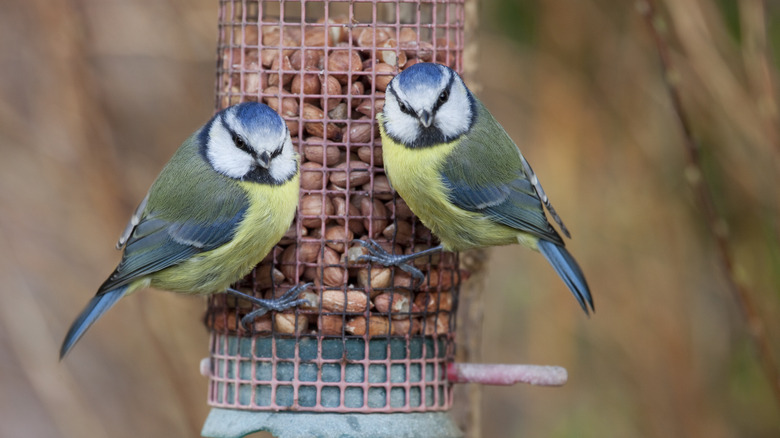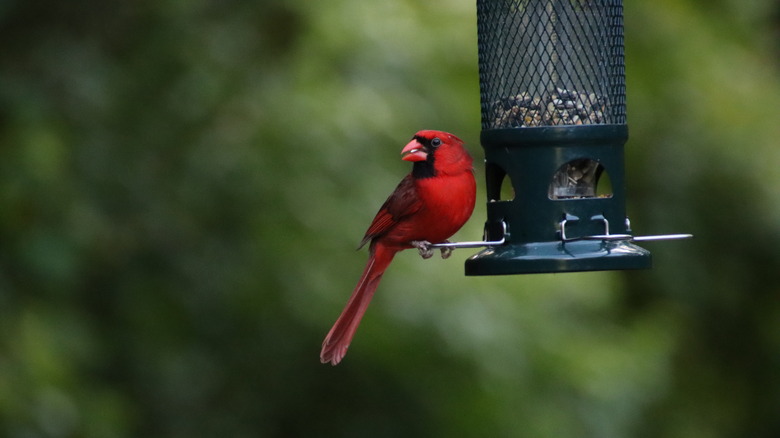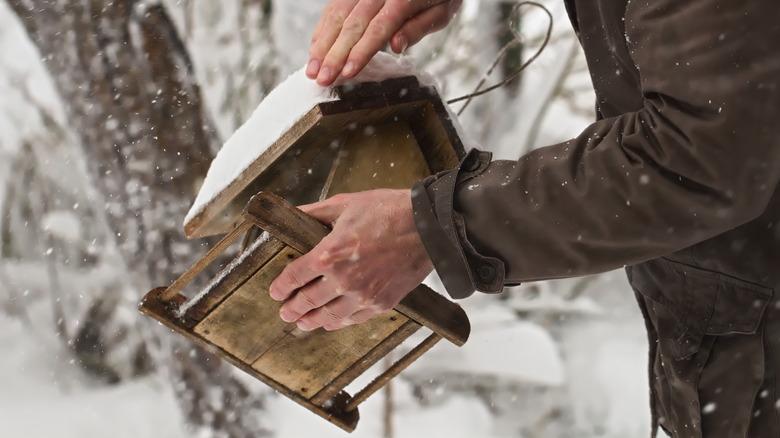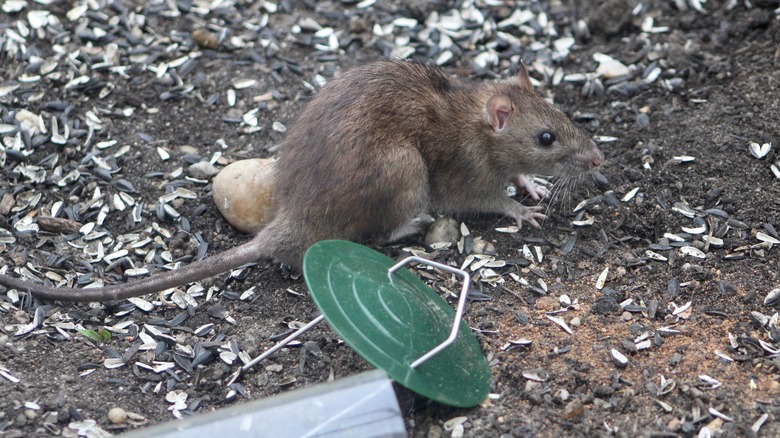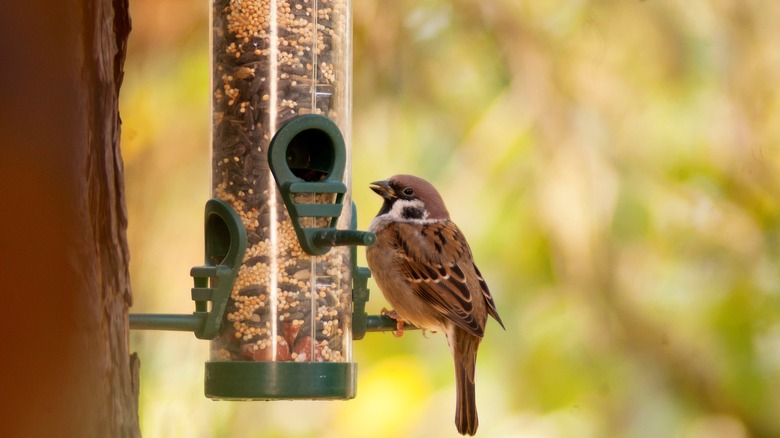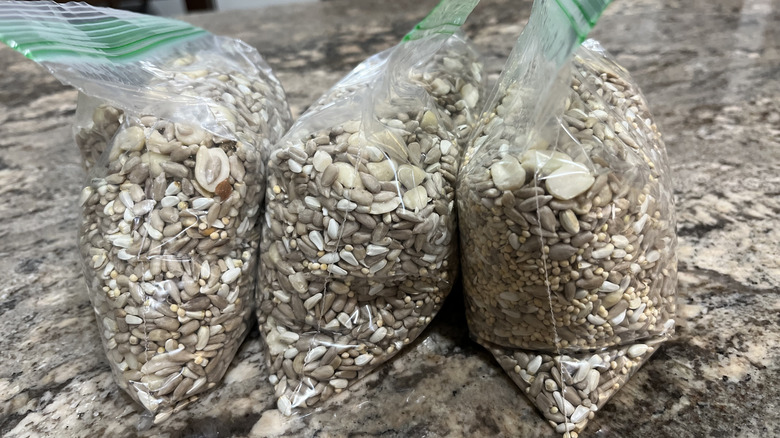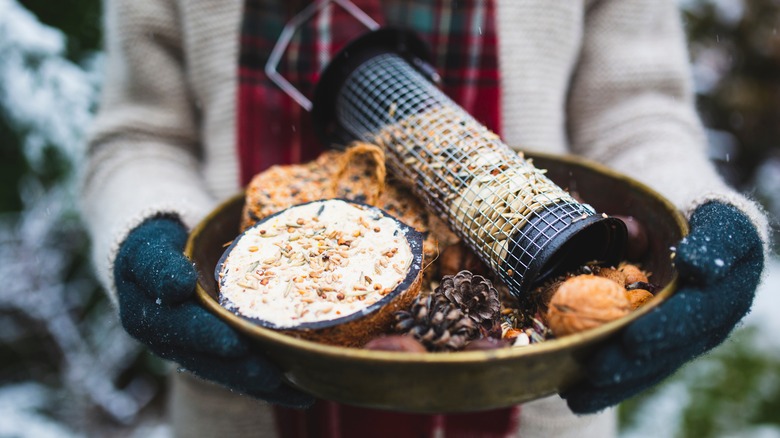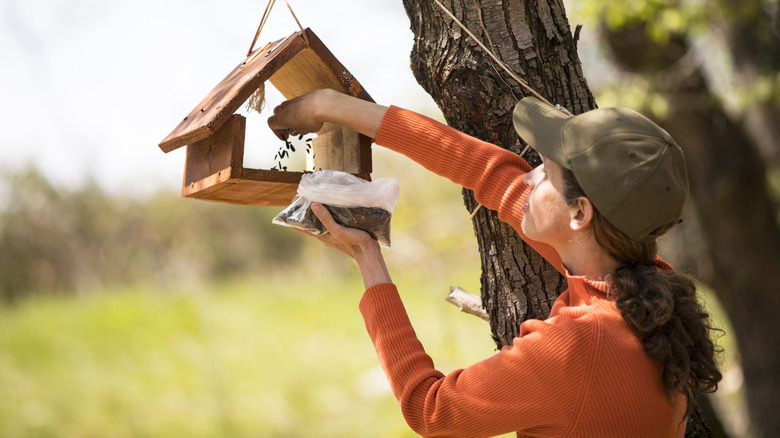7 Mistakes You're Making With Your Bird Feeder
If you have an interest in birds and would also like to help feed them to boost the ecosystem, hanging up a bird feeder is one way to address both of these desires. There are several benefits of having a bird feeder in your yard. Among these include the opportunity to feed rare or endangered birds, reducing the number of insects in your yard that resident birds may feast on, and encouraging them to pollinate vegetation you have on your property.
However, if you've put up a bird feeder and aren't seeing the results you were hoping for, it may be time to assess your strategy. Birds, especially the small backyard variety, may not visit due to issues with food, other animals, or even problems with the feeders themselves. It's important to address as many of these mistakes with your bird feeders as you can so you can continue to draw birds while feeling good about your positive contributions.
Using the wrong types of feeders for backyard birds
When it comes to feeding birds in your backyard or garden, not any feeder will do. Birds of different sizes require different features to help them perch while feeding, and certain feeders can also help keep unwanted visitors out, such as squirrels and crows. Yet by putting up the first feeder you find, you may end up attracting rodents and large birds, and accidentally deterring small birds from visiting.
Instead, consider the type of birds in your area that you're wanting to attract. Small birds, for example, need feeders that deter crows and other large birds from invading their feeding spaces. So, if you know that crows are commonplace in your area, choose a feeder with a cage or wiring around it. Small perches can also discourage large birds from feeding. Also, since squirrels are commonly attracted to bird feeders, consider choosing a version that closes up with the weight of these rodents. If the squirrels cannot get to the bird seed, they may eventually stop trying. Choosing bird feeders that you must hang up elevated off the ground can also help encourage small birds while deterring other critters.
Neglecting to regularly clean your bird feeder
It's a mistake to assume that since a bird feeder is an outdoor item that feeds wildlife and therefore doesn't need to be cleaned. In fact, the exact opposite is true. Neglecting to keep your bird feeders clean not only increases the risk of rotted seed, but you also risk spreading diseases among backyard birds.
To kill disease-causing germs, the Audubon Society recommends cleaning feeders with one part bleach mixed with nine parts of water. Remove all parts of the feeder, and be sure to wipe out any dried-on food or residue that may get stuck. Repeat the process about every two weeks. You may also consider using natural ingredients when cleaning out bird feeders, rather than commercial chemical products that could potentially harm small birds. Examples include vinegar to help get rid of mold, or salt to help scrub stuck-on residue and dirt. Hummingbird feeders, on the other hand, generally need to be emptied and rinsed out with hot water only every week, per All About Birds. They also recommend changing out nectar once every three to five days.
Letting food pile up underneath your bird feeder
As a variety of birds start visiting your yard for regular meals, it's inevitable that spillage will occur as birds peck through food while perching on feeders. Smaller birds may pick around large seeds, for example, leaving them to fall onto the ground underneath the feeders. On the flipside, a large bird may eat sunflower seeds but spit out the hulls when they're done.
While spilt bird seed can create a mess, this is all part of the process of having a bird feeder in your backyard or garden. To prevent a large pile-up of seed that may harbor disease or attract rodents, it's best to clean up underneath the feeders at the end of each day. In the case of rather large piles of accumulated seed, you can shovel these away into a garbage can. At the same time, you'll likely be removing any bird droppings in the mix. Do not reuse any spilt bird seed, as these may be moldy or rotted, and can make your backyard birds sick.
Placing feeders in the wrong locations
When it comes to bird feeder placement, not just any location will do. Poor placement for traditional bird seed feeders can result in window collisions with your home, or even put birds at risk of being killed by predators. Putting hummingbird feeders in the right places are also important to help protect their visitors from predators and natural elements, such as the wind.
Before you put your bird feeder in place, plan out the perfect location that will keep birds happy and safe. The Humane Society recommends placing feeders either close to your home or far away from it. This could mean your feeder is less than three feet away from windows to prevent hard collisions, or instead you can put it at least 30 feet away from feeders so the birds will be less likely to fly into windows in the first place. Also, if you have bushes or trees around your yard, consider placing feeders 12 feet away from them so birds have safe places to quickly retreat to in case predators are nearby. It's also an error to keep hummingbird feeders near windows. Hummingbirds also prefer feeders that are kept in shady, wind-free areas. Again, all feeders should be kept off the ground to avoid easy access to rodents and other animals.
Using the wrong types of seeds for birds
If you've found a large bag of birdseed at a great price from a big box store, chances are it contains a combination of seeds to suit a variety of birds. Yet despite the seemingly good deal, you may end up noticing that birds pick through the seed and discarding a portion of it on the ground without consideration. Even worse, you may not be attracting any birds at all. This all boils down to the fact that, while variety bags can work, they don't always attract the birds in your region.
Instead, you'll want to first investigate which types of birds are in your area, and which ones migrate to your region during different times of the year. Once you've figured this out, you can shop at a garden center or bird supply store for the right foods. For example, according to All About Birds, cardinals, sparrows, and doves like safflower seeds, while finches favor small thistle seeds. Peanuts may also attract jays, titmice, and chickadees. If you see a bag with a lot of flax or millet, you may want to skip it as most birds pick around these seeds. When in doubt, know that sunflower seeds are a safe bet, as most birds love them. Also, if you have a hummingbird feeder, consider making your own homemade hummingbird food nectar rather than buying commercial products that may have harmful dyes in them.
Leaving bird food containers outside
When you're filling bird feeders regularly, it may seem convenient to store bird seed outdoors. However, unless you want to feed rodents and other wildlife too, you should reconsider this option. Even placing bags of seed inside a plastic outdoor bin can have consequences, as mice or rats may find their way inside and feast on the food.
Instead, your best bet is to store bird seed elsewhere so that other critters can't access it so easily. At the minimum, you should place all bird food in airtight containers that can't be chewed through by squirrels, mice, or rats. These should also come with tight lids with little to no access by any wildlife. While you can store these airtight containers outside in a storage shed, an even better option is to bring them into your garage or another enclosed space that makes it harder for rodents to find. You may even opt to store the food in your home. Finally, if you do notice signs of rodents in your yard, you may consider taking bird feeders inside every night to help deter them from eating bird seed. This will also help keep other wildlife away, including foxes and racoons, as well as neighborhood pets.
Keep feeders full, but without overfilling them
Since you undoubtedly want to ensure adequate food supply for backyard birds, it may be tempting to add a little bit of extra seed to their feeders. This is especially the case if you are planning to be gone for more than a couple of days and may not be able to refill them. However, intentionally overfilling bird feeders can lead to more problems than it's worth. For one, this can lead to spillage and possibly attract rodents to your yard. An even more serious problem concerns the health of your birds that come to feed. As Nature Anywhere explains, overfilling bird feeders can compact seeds, leaving them to rot inside the container. When birds eat these rotted seeds, they can become sick, or even die from them.
For the sake of your birds, resist the urge to overfill their feeders. Instead, make it a part of your daily routine to check the feeders to see if they need more seed, as well as whether hummingbird feeders require a nectar refill. If you're going to be away from home for a long weekend or an extended period of time, consider asking a friend or neighbor to take care of your bird feeders while you're gone.
